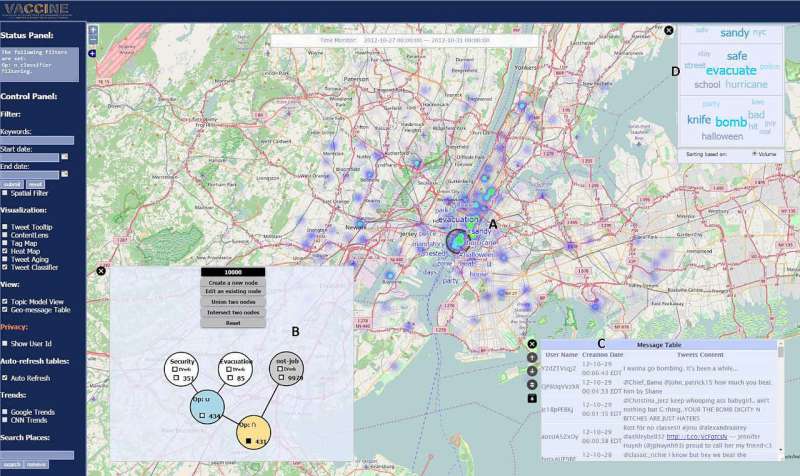Researchers develop platform to help survive hurricanes, natural disasters

Just a few minutes of warning during a natural disaster can mean the difference between life and death.
Imagine being stuck underneath rubble after a hurricane slams landward, knocking out the emergency phone lines. What if social media could save your life? What if an online platform gave you a more accurate, detailed route of a hurricane?
The Texas Department of State Health Services reports 82 people perished when Hurricane Harvey hit Texas, and the Florida Division of Emergency Management reports 72 people in Florida died when Hurricane Irma hit its coast.
As Hurricane Florence continues a fierce push to the East Coast, Purdue University researchers are testing technology to help find victims of natural and man-made disasters.
A new Purdue-created online platform called the Social Media Analytics and Reporting Toolkit could help first responders better monitor areas where hurricanes make landfall, thus help people caught in weather-related disasters. The platform, known as SMART, allows first responders to monitor social media posts to find people in need of help.
"SMART distills the ocean of social media data down to relevant and usable information in real time," said David Ebert, director of Purdue's Visual Analytics for Command, Control and Interoperability Environments and the Silicon Valley Professor of Electrical and Computer Engineering. "What an incredible opportunity to use our engineering talents at Purdue to make a life-saving impact."
VACCINE is a center of excellence for the U.S. Department of Homeland Security, and commercialization of the SMART software is being funded by a grant from the U.S. Department of Homeland Security Science and Technology First Responders Group.
Although the system has not been released publicly, official first-responder organizations can request an account to use SMART during Hurricane Florence by contacting Ebert at ebertd@ecn.purdue.edu.
The technology aligns with Purdue's giant leaps celebration, acknowledging the university's global advancements made in health, space, artificial intelligence and sustainability as part of Purdue's 150th anniversary. Those are the four themes of the yearlong celebration's Ideas Festival, designed to showcase Purdue as an intellectual center solving real-world issues.
First responders can use SMART to select key words and themes, such as flooding or medical emergencies, which are then visually displayed and highlighted on a map as they are talked about on social media within a specific geographic area.
"Imagine being trapped after a hurricane makes landfall and having social media as the only form of communication to reach out for help," Ebert said. "SMART allows first responders to pick up those digital cries for help and take action."
Purdue's technology also allows users to set up customizable email alerts for relevant key words within a specified time frame. Officials in California were trained to use SMART to find victims of this year's wildfires.
SMART also has applications for thwarting potential attacks during major public events, analyzing school threats and monitoring traffic.
"There is really no learning curve because the interface is visual and natural," Ebert said.
Provided by Purdue University




















